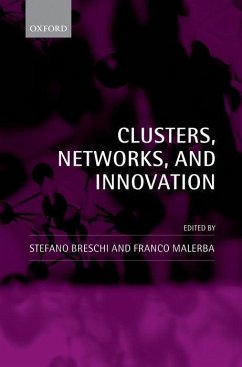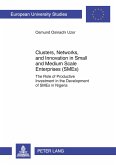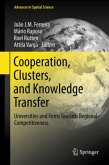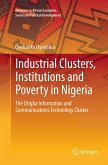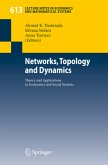- Gebundenes Buch
- Merkliste
- Auf die Merkliste
- Bewerten Bewerten
- Teilen
- Produkt teilen
- Produkterinnerung
- Produkterinnerung
Broad implications are drawn for the design of policies to encourage successful economic clusters in developed and developing clusters.
Recent years have seen strong interest and a growing amount of research and teaching on the phenomenon of economic and business 'clusters'. Even in a global world particular localities appear to have distinctive advantages. A key consideration for industrial policy and business location decisions, this book brings together cutting edge work on the issue by leading international scholars.
Andere Kunden interessierten sich auch für
![Clusters, Networks, and Innovation in Small and Medium Scale Enterprises (SMEs) Clusters, Networks, and Innovation in Small and Medium Scale Enterprises (SMEs)]() Osmund Osinachi UzorClusters, Networks, and Innovation in Small and Medium Scale Enterprises (SMEs)107,00 €
Osmund Osinachi UzorClusters, Networks, and Innovation in Small and Medium Scale Enterprises (SMEs)107,00 €![Cooperation, Clusters, and Knowledge Transfer Cooperation, Clusters, and Knowledge Transfer]() Cooperation, Clusters, and Knowledge Transfer75,99 €
Cooperation, Clusters, and Knowledge Transfer75,99 €![Innovation, Networks, and Knowledge Spillovers Innovation, Networks, and Knowledge Spillovers]() Manfred M. FischerInnovation, Networks, and Knowledge Spillovers75,99 €
Manfred M. FischerInnovation, Networks, and Knowledge Spillovers75,99 €![Soft Innovation Soft Innovation]() Paul StonemanSoft Innovation157,99 €
Paul StonemanSoft Innovation157,99 €![Industrial Clusters, Institutions and Poverty in Nigeria Industrial Clusters, Institutions and Poverty in Nigeria]() Oyebanke OyeyinkaIndustrial Clusters, Institutions and Poverty in Nigeria75,99 €
Oyebanke OyeyinkaIndustrial Clusters, Institutions and Poverty in Nigeria75,99 €![Networks, Topology and Dynamics Networks, Topology and Dynamics]() Ahmad K. Naimzada / Stefani Silvana / Anna Torriero (eds.)Networks, Topology and Dynamics75,99 €
Ahmad K. Naimzada / Stefani Silvana / Anna Torriero (eds.)Networks, Topology and Dynamics75,99 €![Manufacturing Possibilities Manufacturing Possibilities]() Gary HerrigelManufacturing Possibilities179,99 €
Gary HerrigelManufacturing Possibilities179,99 €-
-
-
Broad implications are drawn for the design of policies to encourage successful economic clusters in developed and developing clusters.
Recent years have seen strong interest and a growing amount of research and teaching on the phenomenon of economic and business 'clusters'. Even in a global world particular localities appear to have distinctive advantages. A key consideration for industrial policy and business location decisions, this book brings together cutting edge work on the issue by leading international scholars.
Hinweis: Dieser Artikel kann nur an eine deutsche Lieferadresse ausgeliefert werden.
Recent years have seen strong interest and a growing amount of research and teaching on the phenomenon of economic and business 'clusters'. Even in a global world particular localities appear to have distinctive advantages. A key consideration for industrial policy and business location decisions, this book brings together cutting edge work on the issue by leading international scholars.
Hinweis: Dieser Artikel kann nur an eine deutsche Lieferadresse ausgeliefert werden.
Produktdetails
- Produktdetails
- Verlag: Oxford University Press (UK)
- Seitenzahl: 524
- Erscheinungstermin: 16. Februar 2006
- Englisch
- Abmessung: 236mm x 163mm x 36mm
- Gewicht: 930g
- ISBN-13: 9780199275557
- ISBN-10: 0199275556
- Artikelnr.: 22177508
- Herstellerkennzeichnung
- Libri GmbH
- Europaallee 1
- 36244 Bad Hersfeld
- gpsr@libri.de
- Verlag: Oxford University Press (UK)
- Seitenzahl: 524
- Erscheinungstermin: 16. Februar 2006
- Englisch
- Abmessung: 236mm x 163mm x 36mm
- Gewicht: 930g
- ISBN-13: 9780199275557
- ISBN-10: 0199275556
- Artikelnr.: 22177508
- Herstellerkennzeichnung
- Libri GmbH
- Europaallee 1
- 36244 Bad Hersfeld
- gpsr@libri.de
Stefano Breschi is an Associate Professor of Industrial Economics at Università L.Bocconi and a member of the Board of Directors at Cespri-Bocconi, Milan, Italy. He has published in various international journals. His main research interests concern economics of innovation, industrial economics, industrial dynamics, regional economics, networks and clusters, industrial and technology policy. Franco Malerba is Full Professor of Industrial Economics at Università L.Bocconi. He is Director of CESPRI (Center for Research on Innovation and Internationalization) at Bocconi University. He has been president of the International Schumpeter Society and is currently president of EARIE (European Association for Research in Industrial Economics). He is Editor of the journal Industrial and Corporate Change, and Associate Editor of Research Policy and the Journal of Evolutionary Economics. He has published various books and several papers in various international journals. His main research interests concern economics of innovation, industrial economics, industrial dynamics, international competitiveness, and technology policy.
* Introduction: Clusters, Networks, and Innovation: Research Results
and New Directions
* Part I: New Perspectives on Clusters and Networks
* 1: Robin Cowan: Network Models of Innovation and Knowledge Diffusion
* 2: Giulio Bottazzi, Giorgio Fagiolo, and Giovanni Dosi: On Sectoral
Specificities in the Geography of Corporate Location
* 3: Philip Cooke: Regional Knowledge Capabilities and Open Innovation:
Regional Innovation Systems and Cluster in the Asymmetric Knowledge
Economy
* Part II: Emergence of Clusters and Entrepreneurship
* 4: Timothy Breshanan, Alfonso Gambardella, and AnnaLee Saxenian: 'Old
Economy' Inputs for 'New Economy' Outcomes: Cluster Formation in the
New Silicon Valleys
* 5: Maryann P. Feldman: The Entrepreneurial Event Revisited: Firm
Formation in a Regional Context
* 6: Mark H. Lazerson and Gianni Lorenzoni: The Firms that Feed
Industrial Districts: A Return to the Italian Source
* 7: Steven Klepper: Employee Startups in High-Tech Industries
* Part III: Institutions, Local Communities, National and International
Networks
* 8: AnnaLee Saxenian and Jinn-Yuh Hsu: The Silicon Vally-Hsinchu
Connection: Technical Communities and Industrial Upgrading
* 9: Kellye Porter, Kjersten Bunker Whittington, and Walter W. Powell:
The Institutional Embeddedness of High-Tech Regions: Relational
Foundations of the Boston Biotechnology Community
* 10: Olav Sorenson: Social Networks and the Persistence of Clusters:
Evidence from the Computer Workstation Industry
* Part IV: Localization of Knowledge Spillovers
* 11: Micahel Storper and Anhony J. Venables: Buzz: Face-to-face
Contact and the Urban Economy
* 12: Stefano Breschi, Francesco Lissoni, and Fabio Montobbio: The
Geography of Knowledge Spillovers: Conceptual Issues and Measurement
Problems
* 13: James D. Adams: Comparative Localizattion of Academic and
Industrial Spillovers
* Part V: Public Policies Towards Clusters
* 14: Peter Maskell: Towards a Knowledge-Based Theory of the
Geographical Cluster
* 15: Ron Martin and Peter Sunley: Deconstructing Clusters: Chaotic
Concept or Policy Panacea
and New Directions
* Part I: New Perspectives on Clusters and Networks
* 1: Robin Cowan: Network Models of Innovation and Knowledge Diffusion
* 2: Giulio Bottazzi, Giorgio Fagiolo, and Giovanni Dosi: On Sectoral
Specificities in the Geography of Corporate Location
* 3: Philip Cooke: Regional Knowledge Capabilities and Open Innovation:
Regional Innovation Systems and Cluster in the Asymmetric Knowledge
Economy
* Part II: Emergence of Clusters and Entrepreneurship
* 4: Timothy Breshanan, Alfonso Gambardella, and AnnaLee Saxenian: 'Old
Economy' Inputs for 'New Economy' Outcomes: Cluster Formation in the
New Silicon Valleys
* 5: Maryann P. Feldman: The Entrepreneurial Event Revisited: Firm
Formation in a Regional Context
* 6: Mark H. Lazerson and Gianni Lorenzoni: The Firms that Feed
Industrial Districts: A Return to the Italian Source
* 7: Steven Klepper: Employee Startups in High-Tech Industries
* Part III: Institutions, Local Communities, National and International
Networks
* 8: AnnaLee Saxenian and Jinn-Yuh Hsu: The Silicon Vally-Hsinchu
Connection: Technical Communities and Industrial Upgrading
* 9: Kellye Porter, Kjersten Bunker Whittington, and Walter W. Powell:
The Institutional Embeddedness of High-Tech Regions: Relational
Foundations of the Boston Biotechnology Community
* 10: Olav Sorenson: Social Networks and the Persistence of Clusters:
Evidence from the Computer Workstation Industry
* Part IV: Localization of Knowledge Spillovers
* 11: Micahel Storper and Anhony J. Venables: Buzz: Face-to-face
Contact and the Urban Economy
* 12: Stefano Breschi, Francesco Lissoni, and Fabio Montobbio: The
Geography of Knowledge Spillovers: Conceptual Issues and Measurement
Problems
* 13: James D. Adams: Comparative Localizattion of Academic and
Industrial Spillovers
* Part V: Public Policies Towards Clusters
* 14: Peter Maskell: Towards a Knowledge-Based Theory of the
Geographical Cluster
* 15: Ron Martin and Peter Sunley: Deconstructing Clusters: Chaotic
Concept or Policy Panacea
* Introduction: Clusters, Networks, and Innovation: Research Results
and New Directions
* Part I: New Perspectives on Clusters and Networks
* 1: Robin Cowan: Network Models of Innovation and Knowledge Diffusion
* 2: Giulio Bottazzi, Giorgio Fagiolo, and Giovanni Dosi: On Sectoral
Specificities in the Geography of Corporate Location
* 3: Philip Cooke: Regional Knowledge Capabilities and Open Innovation:
Regional Innovation Systems and Cluster in the Asymmetric Knowledge
Economy
* Part II: Emergence of Clusters and Entrepreneurship
* 4: Timothy Breshanan, Alfonso Gambardella, and AnnaLee Saxenian: 'Old
Economy' Inputs for 'New Economy' Outcomes: Cluster Formation in the
New Silicon Valleys
* 5: Maryann P. Feldman: The Entrepreneurial Event Revisited: Firm
Formation in a Regional Context
* 6: Mark H. Lazerson and Gianni Lorenzoni: The Firms that Feed
Industrial Districts: A Return to the Italian Source
* 7: Steven Klepper: Employee Startups in High-Tech Industries
* Part III: Institutions, Local Communities, National and International
Networks
* 8: AnnaLee Saxenian and Jinn-Yuh Hsu: The Silicon Vally-Hsinchu
Connection: Technical Communities and Industrial Upgrading
* 9: Kellye Porter, Kjersten Bunker Whittington, and Walter W. Powell:
The Institutional Embeddedness of High-Tech Regions: Relational
Foundations of the Boston Biotechnology Community
* 10: Olav Sorenson: Social Networks and the Persistence of Clusters:
Evidence from the Computer Workstation Industry
* Part IV: Localization of Knowledge Spillovers
* 11: Micahel Storper and Anhony J. Venables: Buzz: Face-to-face
Contact and the Urban Economy
* 12: Stefano Breschi, Francesco Lissoni, and Fabio Montobbio: The
Geography of Knowledge Spillovers: Conceptual Issues and Measurement
Problems
* 13: James D. Adams: Comparative Localizattion of Academic and
Industrial Spillovers
* Part V: Public Policies Towards Clusters
* 14: Peter Maskell: Towards a Knowledge-Based Theory of the
Geographical Cluster
* 15: Ron Martin and Peter Sunley: Deconstructing Clusters: Chaotic
Concept or Policy Panacea
and New Directions
* Part I: New Perspectives on Clusters and Networks
* 1: Robin Cowan: Network Models of Innovation and Knowledge Diffusion
* 2: Giulio Bottazzi, Giorgio Fagiolo, and Giovanni Dosi: On Sectoral
Specificities in the Geography of Corporate Location
* 3: Philip Cooke: Regional Knowledge Capabilities and Open Innovation:
Regional Innovation Systems and Cluster in the Asymmetric Knowledge
Economy
* Part II: Emergence of Clusters and Entrepreneurship
* 4: Timothy Breshanan, Alfonso Gambardella, and AnnaLee Saxenian: 'Old
Economy' Inputs for 'New Economy' Outcomes: Cluster Formation in the
New Silicon Valleys
* 5: Maryann P. Feldman: The Entrepreneurial Event Revisited: Firm
Formation in a Regional Context
* 6: Mark H. Lazerson and Gianni Lorenzoni: The Firms that Feed
Industrial Districts: A Return to the Italian Source
* 7: Steven Klepper: Employee Startups in High-Tech Industries
* Part III: Institutions, Local Communities, National and International
Networks
* 8: AnnaLee Saxenian and Jinn-Yuh Hsu: The Silicon Vally-Hsinchu
Connection: Technical Communities and Industrial Upgrading
* 9: Kellye Porter, Kjersten Bunker Whittington, and Walter W. Powell:
The Institutional Embeddedness of High-Tech Regions: Relational
Foundations of the Boston Biotechnology Community
* 10: Olav Sorenson: Social Networks and the Persistence of Clusters:
Evidence from the Computer Workstation Industry
* Part IV: Localization of Knowledge Spillovers
* 11: Micahel Storper and Anhony J. Venables: Buzz: Face-to-face
Contact and the Urban Economy
* 12: Stefano Breschi, Francesco Lissoni, and Fabio Montobbio: The
Geography of Knowledge Spillovers: Conceptual Issues and Measurement
Problems
* 13: James D. Adams: Comparative Localizattion of Academic and
Industrial Spillovers
* Part V: Public Policies Towards Clusters
* 14: Peter Maskell: Towards a Knowledge-Based Theory of the
Geographical Cluster
* 15: Ron Martin and Peter Sunley: Deconstructing Clusters: Chaotic
Concept or Policy Panacea

